For Darryl D’Souza’s YouTube videos click below

Shared from 19th Oct’19 The Navhind Times – Goa eEdition
At Aug’19 Pechakucha Goa on The Story of Your Food. Please click on the pick below to see the video.
Shared from the Jul’18 The Times Of India – Goa eEdition
WHY GOA’S ENGINEERS ARE TURNING TO FARMING
Kimberly.Colaco@timesgroup.com
Gone are the days when doctors, engineers and lawyers were seen as the only success stories in society. In a curious reversal of that trend, many Goan engineers are now hanging their boots, and instead coming back to their lands and their roots to pursue farming and agriculture. Though it might not be as lucrative as their earlier high flying careers, for many, it’s still the best decision of their life! We chat with some of the state’s new-age and unconventional farmers.
WHY FARMING? FOR BETTER HEALTH AND A BETTER SOCIETY
There are many reasons why these former engineers chose to give it up all and turn to farming instead. These include wanting to do something for the environment, to grow more food for an increasing population, or to simply reconnect with the earth and find inner peace.
Alirio Heraclio Botelho, 30, from Nachinola, Aldona, has three degrees – electrical engineering, software engineering and an MBA from NMIMS, Mumbai. Yet, he decided to switch gears, and opt for dairy farming as a profession.
“My family has been into agriculture since my great-grandfather’s time. They looked after plantations of cash crops such as coconut, cashew, arecanut and mango. As a child, I was good at gardening, and my mom would make me plant saplings because I had ‘green thumbs’. However, when my dad tried to get me interested in the plantation work, I couldn’t see myself doing that after completing Engineering,” says Alirio, adding, “It’s funny how, the more we try to change things, the more they remain the same. My dad would have been proud had he been alive now. The only difference between him and me is that I am more ‘Shetkar’ than ‘Bhatkar.”
Suprajit Raikar, 34, a software engineer from Benaulim, turned to apiculture in order to ‘give back to society’. He says, “I didn’t like working in Bangalore. I wasn’t very happy there. So, I decided to come to Goa, and it was here that I learnt about how the farmers were being cheated by middlemen.”
THE NEW BREED OF FARMERS IN GOA
“I started using technology to make people aware of organic food consumption. I realized that venturing into apiculture as a profession was a better option. Though there are so many honey products in the market, there is still always a need for organic honey,” says Suprajit.
Twenty-five-year-old, computer engineer Chaitanya Malik returned to his ancestral property to take up farming, because he knew that it would be a more satisfying career option for him.
He says, “I didn’t want to work under a boss and take instructions. I wanted to be my own boss instead. I realised that there was no point in heading to metro cities and working in the pollution when I could do something on my own here in Goa, and live peacefully.” He adds, “Farming connects you to nature. I have always had passion for it, Whenever we visited our ancestral home, I would love going to our fields, and plantations. It would give me peace.”
“To solve the nation’s malnutrition problem, we need to grow good quality food, and producing food is becoming a real challenge nowadays. With the population growing at an intensive pace, water and land are becoming scarcer every day,” says 33-year-old Ajay Naik, who has a BE degree in Computer Science and Engineering. He explains, “I was looking for agricultural technologies which would help me grow healthy food, and that’s when I came across hydroponics. Through it, one can grow healthy food in a controlled environment, without using soil and with very less land, water, and labour. After two months of research, I decided to start India’s first hi-tech vertical hydroponics indoor farm to grow top quality, pesticide-free exotic vegetables. We started our first farm in late 2016.”
Darryl D’Souza, 48, an Industrial engineer, decided to get into farming after suffering from health problems for over 14 years. He says, “It was mainly a digestive disorder, which required surgery. I had fungal growth in my intestines, besides problems such as blood toxicity and severe skin allergies. I tried all of modern medicine, and it failed to cure my sicknesses. That’s when I turned to natural healing systems, like acupressure and naturopathy, followed by changes in my diet and nutrition, which did most of my healing. From that point onwards, I realized the important of healthy organic food and began to conduct lectures about it at seminars and workshops on health. I realized then that there was hardly any organic farming being done in Goa, and decided to do some myself.”
‘IT TAKES A WHILE TO GET USED TO THE FRUGAL LIFESTYLE’
“Currently, I am just breaking even, after covering my variable costs, such as food for the cows, and the fixed costs of labour, electricity, fuel and EMI’s. In the future too, every 10 cows I add will add ₹40,000 to my bottomline,” says Alirio, adding, “I was earning over a lack a month before resigning from the corporate world. I keep getting asked, ‘why did I take such a big risk?’ The answer is that, for me, the fear of not starting something of my own was much more than the fear of failure. Dairy farming can definitely be remunerative with over 25 cows, the caveat being that you need to supervise the dairy farm on a daily basis for at least a couple of hours.”
Nestor Rangel, an electronic engineer who has a horticulture and dairy farm, believes the more the land, the better opportunities people will have to earn.
Chaitanya adds, “Though the first few years are full of struggle and learning, once you learn the ropes, things are easy. During this phase, one has to be mentally and financially supported by their family. We grow different crops every season, and earn through that too. One can start growing multiple crops, from veggies like bhindi to fruits like papaya and banana, that can yield more money.”
Suprajit says it took him a while to get used to living a frugal lifestyle.
“When I was working in Bangalore, I used to earn around ₹80,000 a month, which I would spend on online shopping, eating out and living a lavish lifestyle. After I took up apiculture, things were really bad the first few years, but are much more stable now. It takes time to get used to not earning much after you earn so much.”
When it comes to dairy farming, the government provides a subsidy on dairy equipment, livestock and infrastructure. The agriculture department too provides a substantial subsidy for purchase of irrigation equipment, mechanization and seed/saplings purchased.
“The Goa government has a lot of schemes for young minds to take up agriculture. I want to be an example for people to take up farming,” says Chaitanya.
‘THE FOUR YEARS OF ENGINEERING REALLY HELPED’
Most engineers have an analytical bent of mind and are good with numbers, and both these qualities compliment the setting-up and running of a business.
Alirio, for example, has developed a system which calculates his per day, per cow nutritional requirements and profitability at the click of a button, and uses technology to reduce dependence on labour. “I have also added a sprinkler irrigation system, which is designed to be fully automated. That way, one acre of land gets irrigated at one time without the use of labour to change sprinklers or valves. Since the climate of Goa is hot and humid, we have made the structure in a way where there is ample cross-ventilation.”
“We have used a lot of agricultural engineering techniques and modern farming techniques, like drip irrigation and polyhouse technologies. Those four years of engineering really helped,” says Chaitnaya.
Darryl follows the principle of permaculture design. “It’s about using the available natural resources to get the best possible soil quality and environment for food growing. I also follow the principles of organic farming and natural farming to get the best produce with least cost. From my industrial engineering experience and specialization in supply chain engineering, I began to look at the contamination in our food supply chain that is the cause of so many illnesses in society. The results were shocking and from that day onwards, I began doing a seminar called ‘Small changes for a big impact in your health, food supply, the environment and this planet.”
‘MY FAMILY WANTED ME TO TAKE UP A JOB WITH A STEADY INCOME’
Many didn’t find it easy to convince their parents about their farming aspirations.
“There was some convincing that needed to be done with regard to sustainability, but once my folks knew that I was serious, they went with the idea. In a way, I am lucky that I don’t have any dependents or other financial obligations. Luckily, I cleared my education loan before I resigned and this gave me a lot of flexibility in decision-making and utilization of my time,” says Alirio.
Suprajit says that he too comes from an affluent family, and so his family wasn’t very keen on him pursuing this career. “My family was not sure why I wanted to take it up. There were also questions raised about me being from a high caste family and working in the fields. However, caste never made any difference in my mind.”
Chaitanya too says his parents would have preferred him to be an engineer. “They asked me to look for a stable job with a monthly income, while I was of the opinion that when I start a business, it has to be full-time. For the first year, there was hardly any income, and my parents were skeptical. However, after a year, there were returns, and we have been doing well. In fact, they are now encouraging me to expand the business.”
Luckily for Nestor, his family was already doing well, so it didn’t take much to convince them to let him take up cultivation.

 MY FAMILY HAS BEEN INTO AGRICULTURE SINCE MY GREATGRANDFATHER’S TIME. THEY LOOKED AFTER PLANTATIONS OF CASH CROPS SUCH AS COCONUT, CASHEW, ARECANUT AND MANGO. AS A CHILD, I WAS GOOD AT GARDENING, AND MY MOM WOULD MAKE ME PLANT SAPLINGS BECAUSE I HAD ‘GREEN THUMBS’. MY DAD WOULD HAVE BEEN PROUD HAD HE BEEN ALIVE NOW. THE ONLY DIFFERENCE BETWEEN HIM AND ME IS THAT I AM MORE ‘SHETKAR’ THAN ‘BHATKAR’. – Alirio Heraclio Botelho, 30 from Nachinola
MY FAMILY HAS BEEN INTO AGRICULTURE SINCE MY GREATGRANDFATHER’S TIME. THEY LOOKED AFTER PLANTATIONS OF CASH CROPS SUCH AS COCONUT, CASHEW, ARECANUT AND MANGO. AS A CHILD, I WAS GOOD AT GARDENING, AND MY MOM WOULD MAKE ME PLANT SAPLINGS BECAUSE I HAD ‘GREEN THUMBS’. MY DAD WOULD HAVE BEEN PROUD HAD HE BEEN ALIVE NOW. THE ONLY DIFFERENCE BETWEEN HIM AND ME IS THAT I AM MORE ‘SHETKAR’ THAN ‘BHATKAR’. – Alirio Heraclio Botelho, 30 from Nachinola
I DIDN’T LIKE WORKING IN BANGALORE. I WASN’T VERY HAPPY THERE. SO, I DECIDED TO COME TO GOA. I REALIZED THAT VENTURING INTO APICULTURE AS A PROFESSION WAS A BETTER OPTION. THOUGH THERE ARE SO MANY HONEY PRODUCTS IN THE MARKET, THERE IS STILL ALWAYS A NEED FOR ORGANIC HONEY. – Suprajit Raikar, 34, from Benaulim
I DIDN’T WANT TO WORK UNDER A BOSS AND TAKE INSTRUCTIONS. I WANTED TO BE MY OWN BOSS INSTEAD. I REALISED THAT THERE WAS NO POINT IN HEADING TO METRO CITIES AND WORKING IN THE POLLUTION WHEN I COULD DO SOMETHING ON MY OWN HERE IN GOA, AND LIVE PEACEFULLY. – Chaitanya Malik, 25, Alto Porvorim
FROM MY INDUSTRIAL ENGINEERING EXPERIENCE AND SPECIALIZATION IN SUPPLY CHAIN ENGINEERING, I BEGAN TO LOOK AT THE CONTAMINATION IN OUR FOOD SUPPLY CHAIN THAT IS THE CAUSE OF SO MANY ILLNESSES IN SOCIETY. THE RESULTS WERE SHOCKING. – Darryl D’Souza, 48, from from Candolim
THROUGH HYDROPONICS, ONE CAN GROW HEALTHY FOOD IN A CONTROLLED ENVIRONMENT, WITHOUT USING SOIL AND WITH VERY LESS LAND, WATER, AND LABOUR. AFTER TWO MONTHS OF RESEARCH, I DECIDED TO START INDIA’S FIRST HI-TECH VERTICAL HYDROPONICS INDOOR FARM TO GROW TOP QUALITY, PESTICIDE-FREE EXOTIC VEGETABLES. – Ajay Naik, 33, from Mapusa
Interview in Business World Magazine, Apr’18 by Nina Kler
India Needs A Renaissance In The Field Of Medicine
World Health Day is a global health awareness day celebrated every year on 7th April, under the sponsorship of the World Health Organization, as well as other related organisations. This year the theme is: Universal health coverage: everyone, everywhere.
UHC means that all individuals and communities receive the health services they need without suffering financial hardship. It includes the full spectrum of essential, quality health services, from health promotion to prevention, treatment, rehabilitation, and palliative care.
Today, at least half of the world’s population still do not have full coverage of essential health services. Over 80 crore people (almost 12 percent of the world’s population) spend at least 10 percent of their household budgets to pay for health care. India has a long way to go.
To mark this day, Darryl D’Souza, a Pioneer in Integrative Mind, Body & Spirit Medicine shared his views on health, healthcare and his recommendations for a healthier life with BW Businessworld. 
What is health according to you, keeping in mind the mind body soul connect?
Much earlier, life was integrated because society was integrated thanks to ancient cultural time-tested practices. Modern ideas have caused a separation where different groups of people choose to excel in specific areas of their preference like the physical dimension that gives a lot of importance to the body and its looks, or the mind and its endeavor of smartness and intellectualism or the spirit and its other worldly aspirations of moksha, bliss, and enlightenment. This has resulted in an unbalanced development of the individual. It has also caused the subscribers of each of these philosophies to glorify their area of excellence and put down the other areas with derogatory labels such as materialistic, egoistic and light headedness.
The way of making people holistic and healthy is to design our homes, education systems, work spaces, social events and our arts & cultural events with energies that have a balance of body, mind & spirit. There are very few individuals and institutions across the globe who are doing such work and this needs to go mainstream for all in society to benefit. My work in integrative mind, body & spirit medicine since 2005 is one such endeavor that has connected doctors, healers, therapists, counselors, healthcare providers and the common man. They all speak a common language now and have a very balanced, cohesive and supportive outlook towards healing the human body of sickness. Now I am part of a global organisation whose mission is integrative human development and we are indeed fortunate that it is founded in India.
A high-quality human being is a self-empowered being who has the skills to handle the hurdles of modern life. It is a being free from illness, free from negative attitudes, and one who creates value wherever they go. They become an asset to their families, their societies, and their nation. A high-quality human being is a being who brings optimism and cheer along with them, and while doing this, they do not cause any damage to others or to the environment. This was the essence of my speech at the 1st World Parliament on Spirituality in 2012.
What are your views on access to universal access to quality healthcare in India today?
In India, people in metro cities believe that they have access to ‘quality healthcare’ and they measure the quality by looking at how highly placed and priced a doctor is, how clean and ordered a hospital is, how long a medical prescription is, and how long the list of recommended diagnostics are. Costly is equated with quality.
Are individuals or healthcare institutions keeping an emphasis on how fast recovery from sickness actually is? And has that recovery been achieved in one area of the body by compromising another? Why is surgical removal of an organ seen as something lofty as compared to a natural cure that takes longer, but does not deprive a human being of a part of their body? In a country like India that has such ancient health traditions like ayurveda, yoga, and acupressure, why has reactive healthcare dominated preventive healthcare?
India needs a renaissance in the field of medicine and I know it will be possible thanks to the ongoing endeavors and passion of thousands of healers, therapists, naturopaths, yoga acharyas, counselors and advocates of holistic medicine in the country. India can show the way to the world once again in the field of medicine, if our institutional heads and heads of government take a holistic and inclusive approach to the subject.
What are your recommendations for better access of healthcare?
Metro cities in India are already overcrowded with commercial and disintegrated medicine setups. The setting up of smaller integrative mind, body & spirit medicine centers is a simpler task and can be done all over the country. That is how people will have regular and local access to healthcare.
In 2016, I sent an official proposal to Goa Tourism Development Corporation of promoting Goa as a tourist destination for wellness. It was innovative enough to generate income for the local people through space rentals, employment for local youth, natural landscaping of the premises to facilitate healing, organic food production and consumption, cleaning up of the air, water and garbage, and it proposed of local parks for exercise, recreation, and sport. Unfortunately, GTDC has not yet acted upon it, but such similar win-win models can be implemented everywhere in India.
Acquiring integrative mind, body & spirit medicine skills is not a herculean task at all. It was what I did in 2003-05 to save my own life, after the best of modern medicine could not help me over 14 years of progressive sickness.
What are your recommendations for better health?
Have a healthy diet.
Get at least 1/2 hr of direct sunlight every day.
Walk or stand on bare earth for half an hour a day.
Have 1 hour of physical activity every day.
Beat stress through meditation, by spending time with nature, being with children, watching fun movies and expressing yourself through art and culture. Be a social person and interact with people in fields of your interest.
Darryl D’Souza at TEDxPanaji Feb’18 speaking on – What is Food for Human Beings – How he cured Chronic Illnesses and Reverse Aged. Please click on the pic below to see the video that is reaching 2 million views.
Interview in The Herald newspaper, Nov’16
Darryl D’Souza at the Goa Environment Festival with Miguel Braganza – Secretary of Botanical Society of Goa, Clea Chandmal – Permaculturist, Rita Mody Joshi – President of Confederation of Indian Industries Women’s Wing and Ulhas Kakode – Director of The Agricultural Dept. of Goa. Panel discussion on Organic Farming and Environment. The topics discussed were:
Panel discussion on Organic Farming and Environment. The topics discussed were:
1. The negative effects of commercial chemical based farming on the soil, farm produce, depleting water table, health of people, cost of food, logistics of food supply, the environment and global warming.
2. The benefits of Organic and Natural Farming.
3. Farming better suited for Goa.
4. Organic farming and the wellness industry.
5. The value of growing local, seasonal and resource aligned crops.
6. Involvement of the common man in food growing.
7. Attracting people to a business of profitable organic or natural farming.
8. Consumer awareness of the positive impacts of organic and natural farming.
9. Organic Certification
10. Government aid promoting farming ventures.
Darryl D’Souza speaking at The 2nd World Parliament on Spirituality Nov’16 on Unity Consciousness within manifests World Peace Without. Please click on the pic below to hear him.
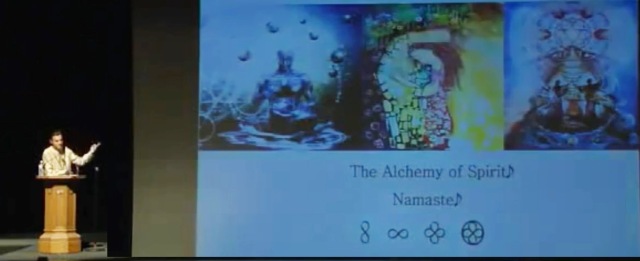 Darryl D’Souza’s interview on ‘Curing Illness with Integrated Natural Therapy’ by Sara Jane on Gift of Healing TV, Sep’16
Darryl D’Souza’s interview on ‘Curing Illness with Integrated Natural Therapy’ by Sara Jane on Gift of Healing TV, Sep’16
Towards Planetary and Human Health: The Work of Darryl D’Souza
By writer Burl Benson Hall, publisher to OpEd News and the host of BlogTalkRadio show ‘Envision This’.
The past several centuries has provided major scientific, spiritual, philosophical and epistemological challenges for us human beings. It appears that we have gone hog wild in our domination of Nature, both in terms of human Nature as well as planetary. The story of human domination was indeed a marker for the beginning of what we call civilization. In a sense, the course of civilization is marked by human top-down ethos that led to a rape of Nature, the human Psyche (Soul or Mind) and women specifically.
Consider this message in relationship to the wisdom expressed in the following cartoon regarding the education of our children.
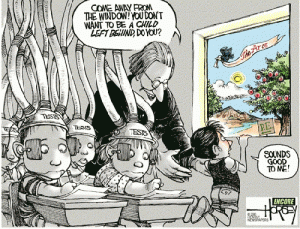
We have ultimately lost the natural wisdom of our ancestors through dogmatic, idealistic and rationalist approaches to all the major disciplines. These approaches further cultivated a strict top-down rule that spoke of God over Man who was over Woman who was over Nature. No one dared to claim; however, that Nature meaning Essence was also Yahweh, or I AM (i.e., the Universal Self).
Yet, in recent times, many Western scholars began to see the wisdom of ancient lifestyles and their belief in an intelligent Nature. One such scholar was James Lovelock, who developed the Gaia Hypothesis. This hypothesis states that Gaia (Earth) operates as a single organism. In essence, within all of us, there is a complex interaction between our cells in relationship to external plants, animals, atmosphere, land and seas that make the world habitable for the type of life we have today. We are participants in the System and NOT the Kings of it! Furthermore, it appears the System builds itself and not some externalized God or Goddess. There is literally nothing to believe in. Its simply looking at the process of what Lao Tzu, author of the Tao Te Ching, refers to as the Way. The Way is simply the Process of Nature.
Realizing this deep wisdom of Nature, holistic health practices exist as forms of healing that consider the whole person — body, mind, spirit, and emotions — in relation to the environment in which he or she resides. The ultimate quest of holistic health practices is for optimal health and wellness. One can achieve optimal health — the primary goal of holistic medicine practice — by gaining proper balance in life.
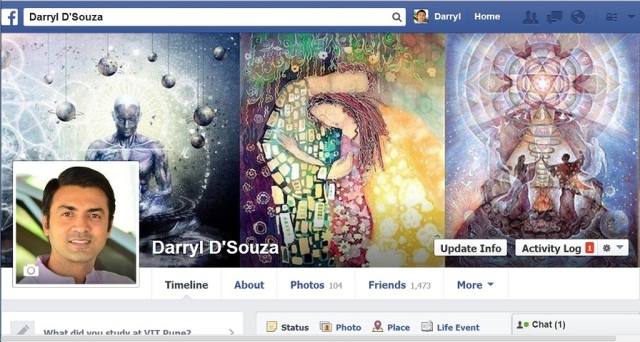
Darryl D’Souza is one such holistic healer. Darryl is a vibrant and committed holistic healer from India who edits the new monthly online magazine on holistic health called CMSE (Continued Medico-Spiritual Education). CMSE helps doctors, holistic healers and the general public learn from one another about maintaining health. His magazine is an initiative of THE WORLD UNITED Doctors’ and Healers’ Association.
The World United Doctors and Healers Association (TWUDHA) was originally founded as New Age Doctors Association. It was founded in May 2007 with the launch of India’s 1st CMSE (Continued Medico-Spiritual Education) in the city of Hyderabad, India after a few brainstorming sessions among a group of enthusiastic and dedicated Holistic Health Practitioners. These practitioners came forward to create this platform. They wanted all the health professionals to learn from each other in order to create a global holistic health model. Therefore they morphed into a Doctors and Healers Association under the auspices of The World United.
Wherever you are in the journey of self-actualizing, the holistic model of practice assists you by keeping you updated regarding the diverse holistic options available in the health care division. These options range from the ancient to the new age remedies encompassing a wide gamut of therapies.
TWUDHA’s vision is to merge the wisdom of conventional healthcare, alternative healthcare and the ancient healing sciences, in order to evolve a holistic model of health that is minimally invasive, safe and economical. They envision merging the wisdom of conventional healthcare, alternative healthcare and the ancient healing sciences, in order to evolve a holistic model of health that is minimally invasive, safe and economical. They intend to become a resource of information for the multitude of safe and effective healthcare options available, and to facilitate a worldwide network of wellness centers where holistic remedies are practiced.

I applaud this vision. Healthcare clearly needs deeper reform than just a change in how we pay for it–in how medication and treatment is commodified. Healthcare needs to honor and promote the health of each person’s whole being, not just treat chronic illnesses as cash cows.
The primary principles of Holistic Medicine are to help a person towards a total well being in all domains of their lives: physicial, psychological, emotional, vocational and spiritual. They also help people cultivate appropriate attitudes for personal well-being as well as helping to change life style practices. Of course, life style changes are paramount in the practices of holistic health as is appropriate nutritional practices.
The ultimate goal is to empower people to take care of their own health by cultivating inherent healing abilities. The thrust towards this end entails developing positive relationships that can foster the cultivation of personal energy.
Darryl has also written a book on these therapies, Become Healthy or Extinct. The issue of moving humanity away from focus on illness toward holistic health is that radically important to Darryl. He believes the future of humanity depends on this shift. Therefore, the book is available as a free download on the home page of his website :http://becomehealthyorextinct.com!
Darryl does a monthly 1-day workshop on health titled “Curing Chronic Illness without Medicines” in different locations within India. He also does a weekend spiritual workshop called ‘The Alchemy of Spiritual Transformation’ for those who want to be part of the great evolutionary transformation that is under way on our planet. He also does a weekend spiritual workshop called ‘The Alchemy of Spiritual Transformation‘ for those who want to be part of the great evolutionary transformation that is under way on our planet.
He is not alone in his work towards spiritual transformation. Indeed, there appears to be a movement afoot within the human race to evolve and enter a new paradigm. This evolution is being written about, and is manifesting. As Anne Baring says in her Dream of the Cosmos: A Quest for the Soul:
We are awakening to what I have called the Dream of the Cosmos–the dream of an enlightened humanity engaging in a new role on this planet: a role that is in harmony with the evolutionary intention of the Cosmos and is no longer driven by the quest for power, conquest and control and the appropriation of the Earth’s resources for the benefit of the few. As we begin consciously to align ourselves with the luminous ground of reality, our minds will serve the deepest longing of our heart, the deeper wisdom of the Soul.
Will this evolution truly unfold?
Who can say for certain? It will manifest if we co-create it; it won’t manifest if we continue to live, act, and work out of our current paradigm. Do you believe it can become humanity’s future? Are you helping to make it so? These are the more important questions.
…………………………………….xxxxxx…………………………………….
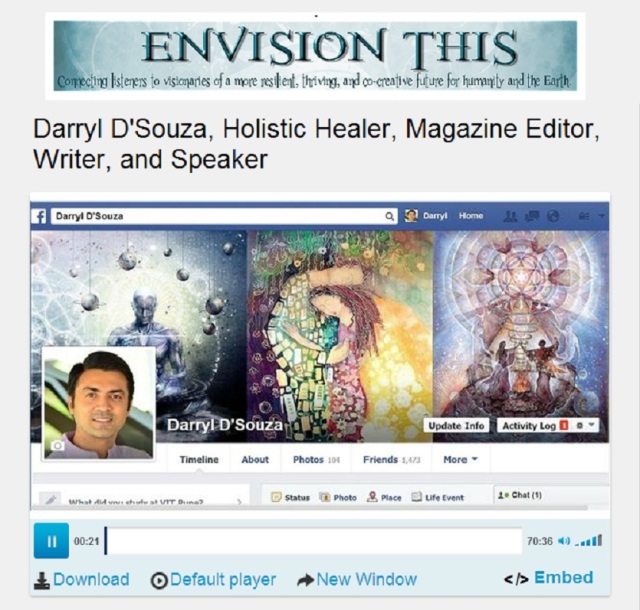
Click on the above image or on this link to hear my BlogTalkRadio interview on my healing journey, the book that came out of it, The World United – Doctors’ & Healers’ Association, and the CMSE -Magazine on Holistic Health
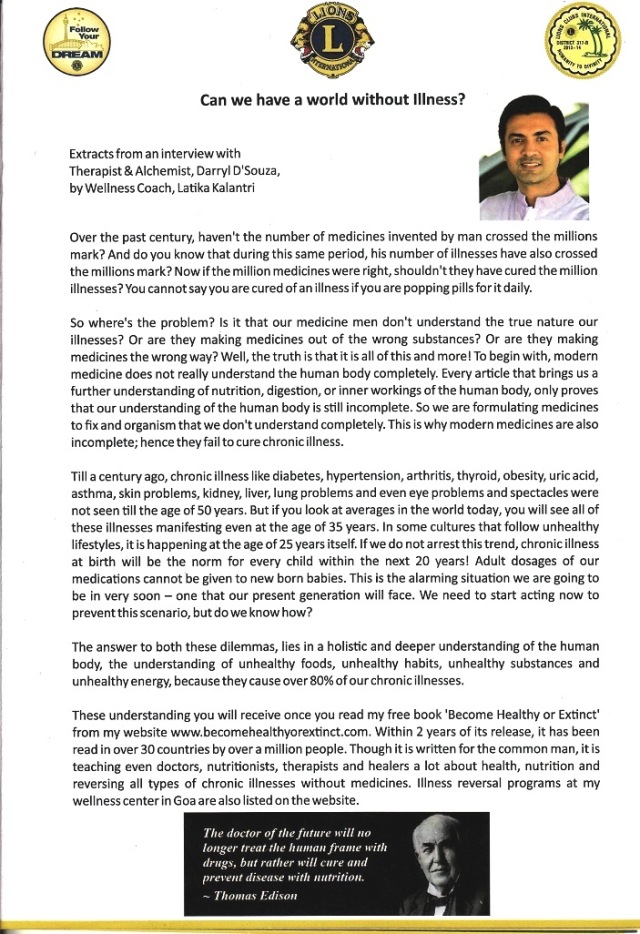
Article in THE WORLD UNITED Spiritual E-Digest Oct’13 Issue
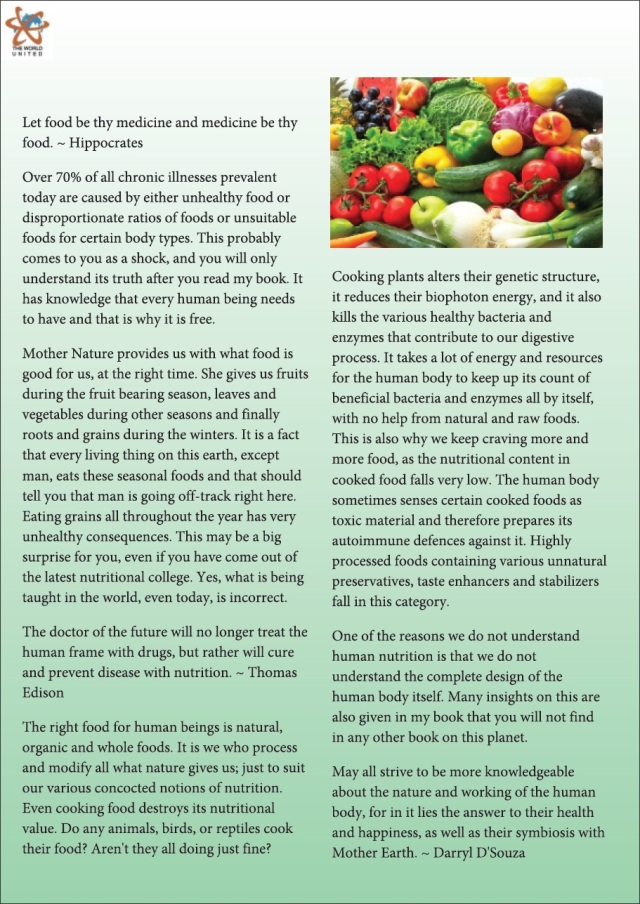
Article in E-Zine Kaleidoscope October’13
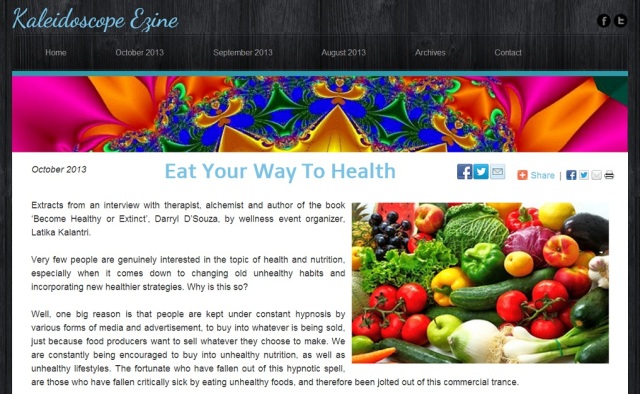 .
.
Interview in E-Zine Kaleidoscope June’13

.
Article in Energy Works magazine Jun’13
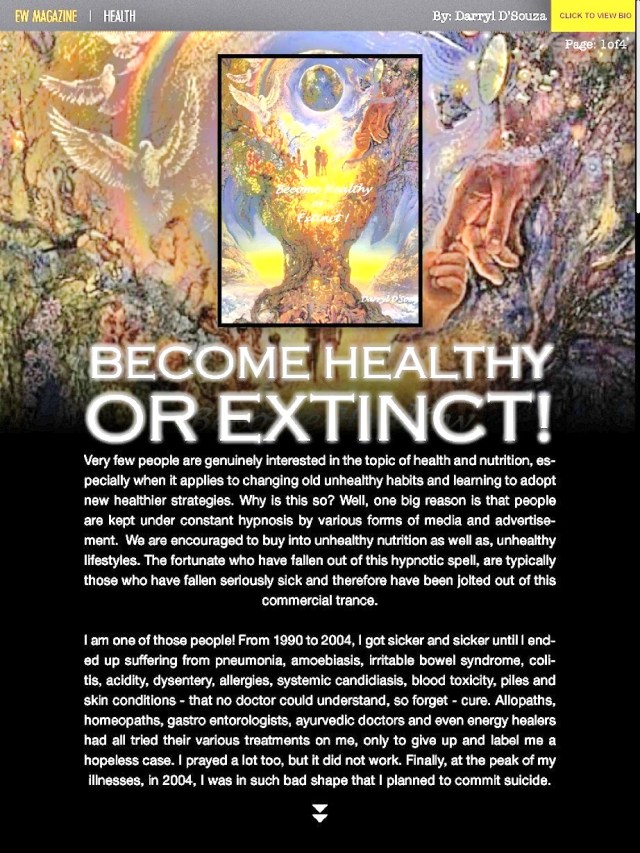
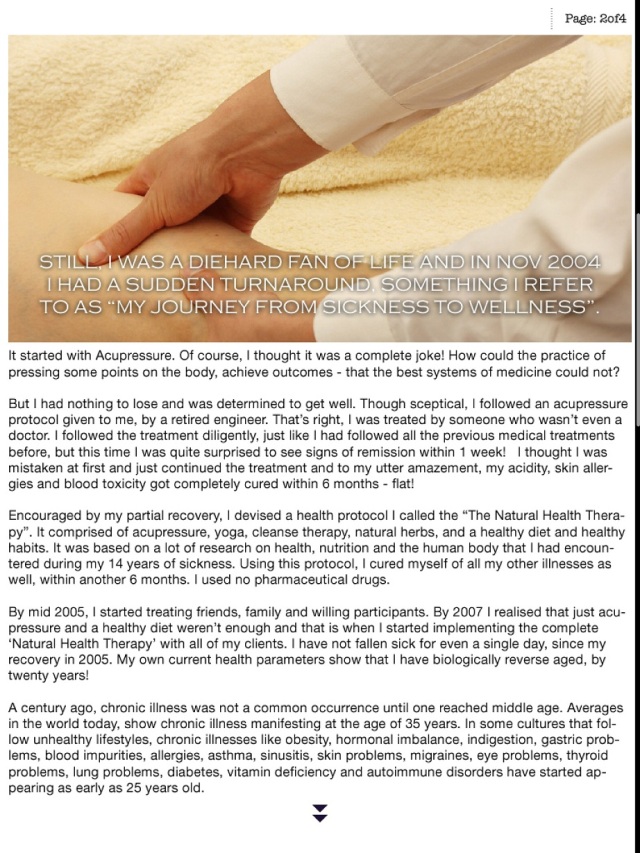

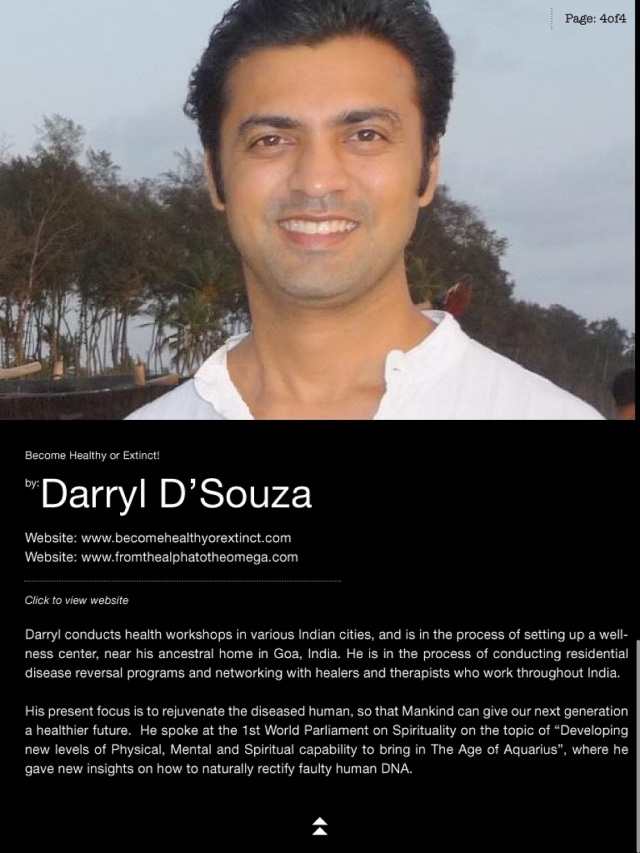
Interview in Life Positive Mar’13 by wellness event organizer Latika Kalantri
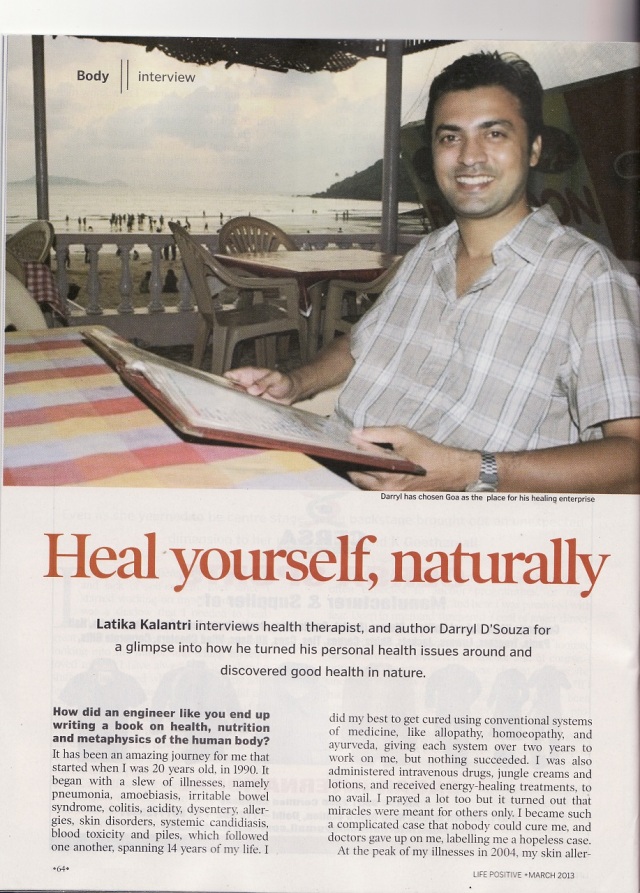
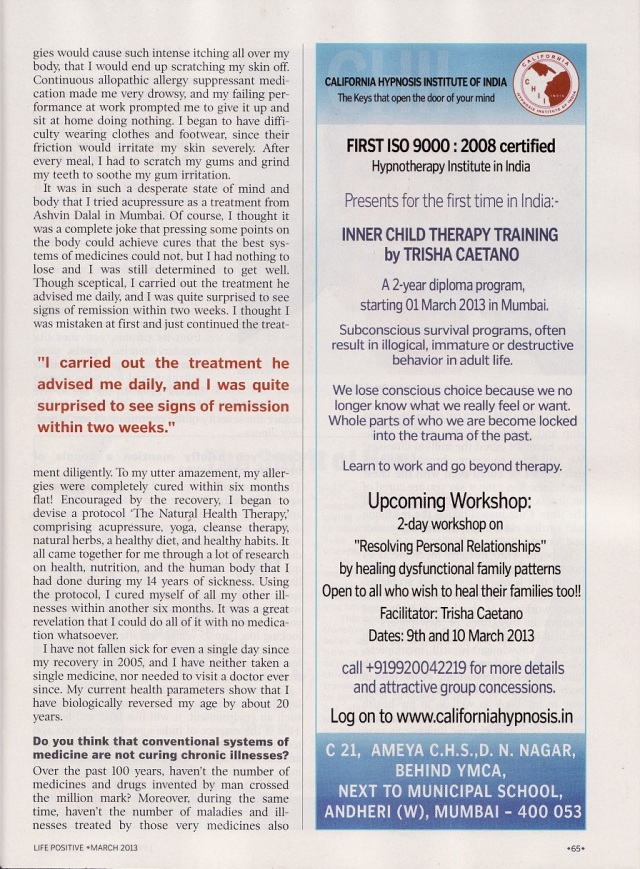

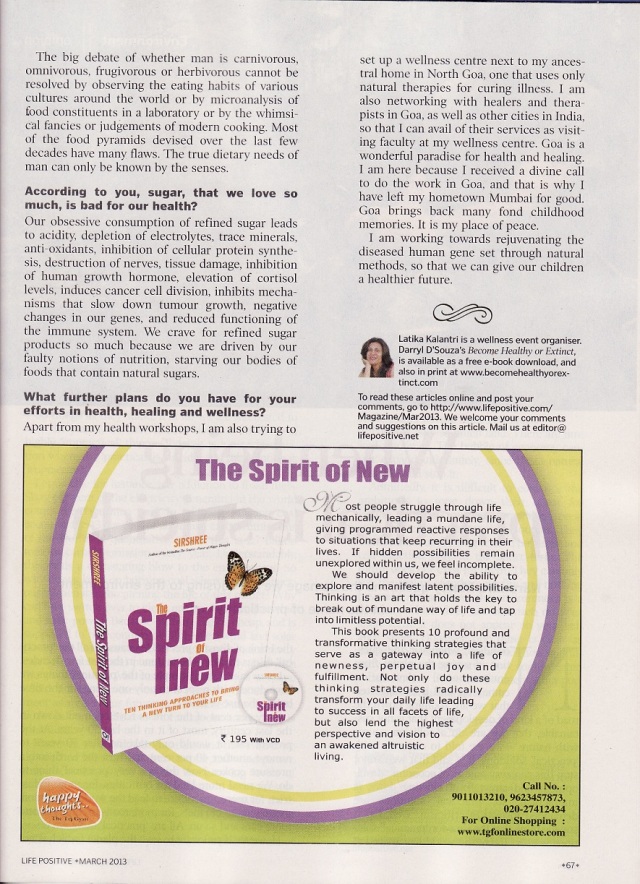
.
.
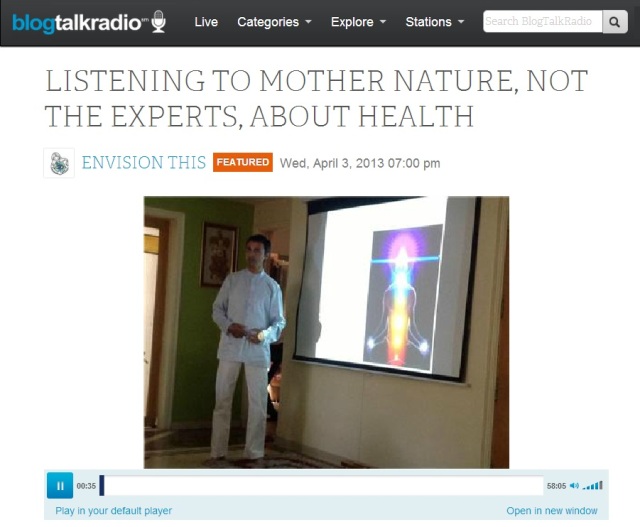
.

.
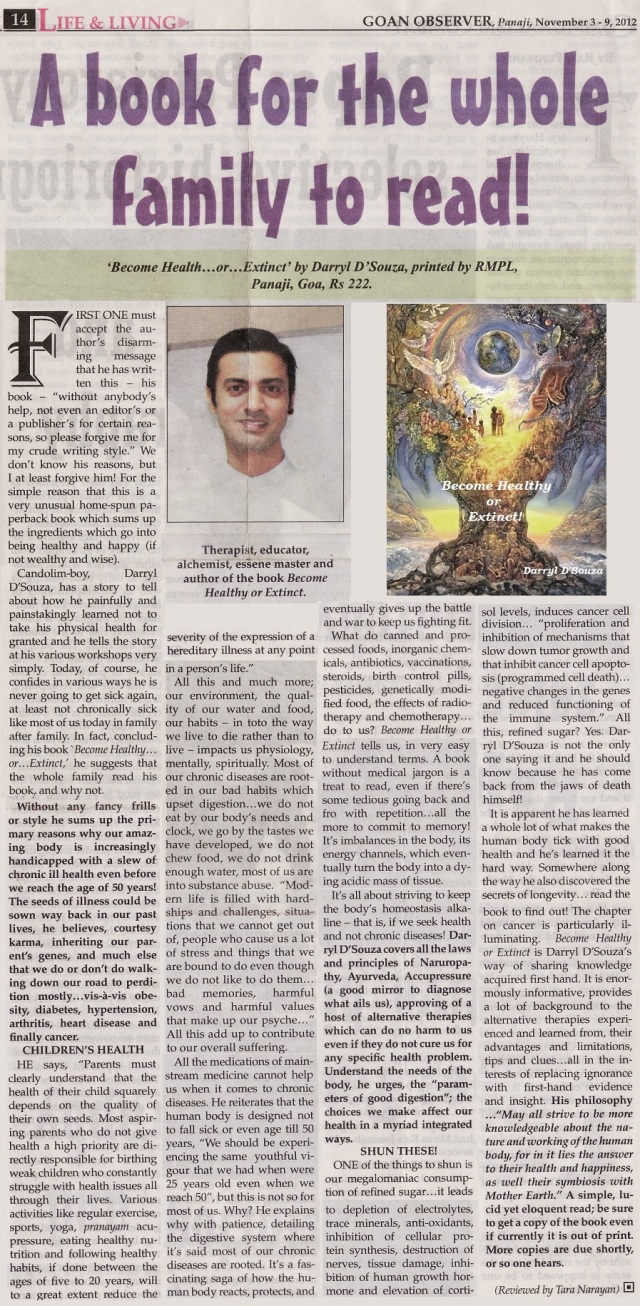
.

.
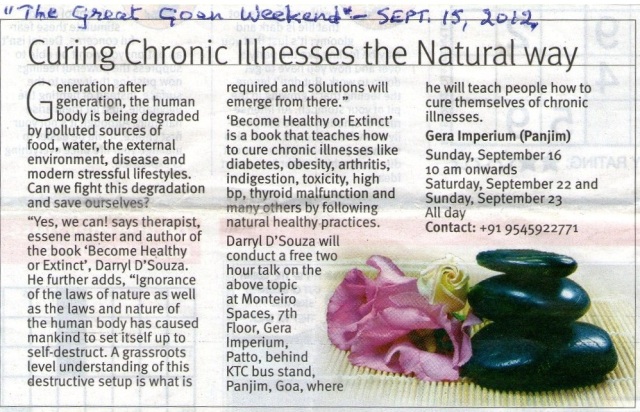


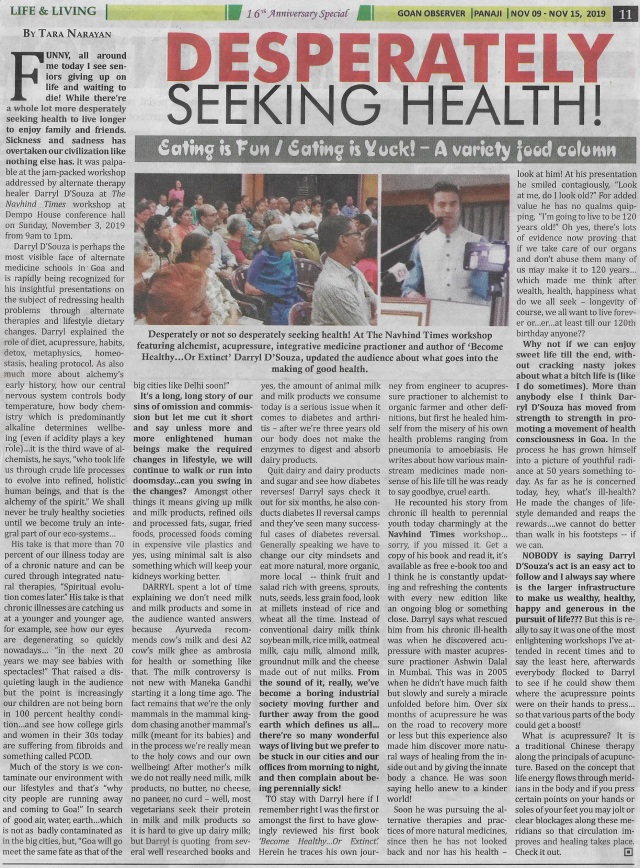
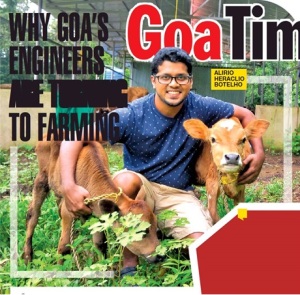


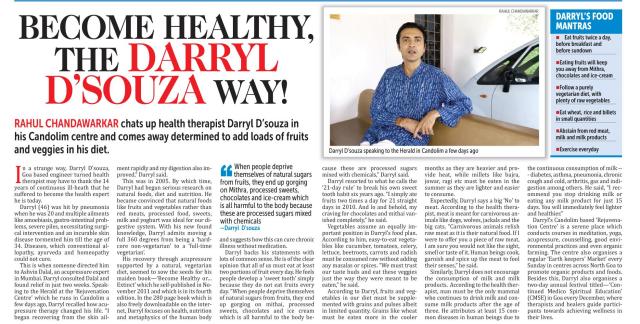
Hi Darryl, I am Susmita Chowdhury from New Delhi, truly inspired by you and your way of dealing with your sickness and motivating so many of us :) I too wish to have a healthy body and mind, and I would love to attend your workshop “Curing Chronic illness workshop” in Goa. Where can I find the schedule of your workshops? Is any programme being held in New Delhi?
Good to hear from you Susmita! and happy to see your commitment to good health. You will find the schedule of my workshops at http://www.becomehealthyorextinct.com/therapy I plan to do a workshop in Delhi in June this year. It will get updated on that page as soon as it gets scheduled. See you in class :)
Hi Darryl, I read this issue of Life Positive while I was in India. I have read all your articals and would ask you if you can suggest anything natural on psoriasis. My brother suffes from this after his kidney transplant.
Hi Juliana, Your brother needs to improve his lung function as well as his kidney function. A bit of diet change to promote healthy gut bacteria is also required. Please ask him to visit me for a diagnosis and treatment protocol.
Dear Darryl Sir, Please message me your contact mobile no. My son who is 5yrs old is having a Mediastainal germ Cell tumor between two lungs spreaded over right side. More doctors are saying to do operation but we are poor and we cannot spend so much money. We are facing financial problems; lot of debt. Please sir i want to discuss with you breifly about my son. Please save my son by your ideas/techniques, pls help us sir. I will be very greatful if u are supporrting us now please sir help us.
Dear Sundar, I received your email too, and I replied that I will see your son the day after I do my health workshop in Bangalore. There is hope, don’t worry. Best Regards, Darryl